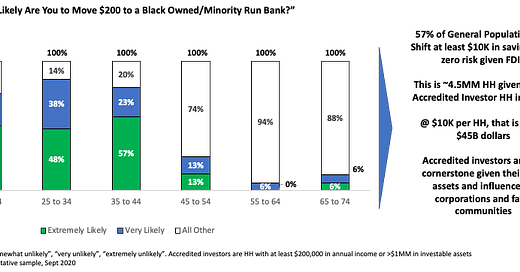Radical Generosity, Conscious Capital, And How The New Category of “Justice Deposits” Is Dismantling A Racist Banking System
#justicecapital
Arrrrr! 🏴☠️ Welcome to a 🔒 subscriber-only edition 🔒 of Category Pirates. Each week, we share radically different ideas to help you design new and different categories. For more: View the mini-book archive | Listen to another category design jam session | Dive into an audiobook | Enroll in the free Category Accelerator email course
Dear Friend, Subscriber, and fellow Category Pirate,
Category designers create abundance.
Metaphorically speaking, while the rest of the world fights over bananas, category designers take it upon themselves to plant more banana trees.
They subscribe to the belief that “When We All Do Well, We All Do Well,” underscoring prosperity is not a zero-sum game where one person wins and everyone else loses.
Most importantly, they bring new things into the world, create new demand for new “solutions” to new or reimagined problems, and make it a priority to be generous in the process—not just to their customers, but to their employees, value-chain partners, investors, and of course, the community and society overall.
Why?
Because savvy category-defining companies (intuitively or consciously) understand that radical generosity is not only good for the world, but also good for business.
Netflix is a great example of a category creator who is radically generous with their breakthrough products, business model, and data flywheel.
They are generous with their products, dropping episodes of an entire season all at once so customers can binge them. They are generous in their business model, giving content creators free rein and huge checks to create as they see fit. And their data flywheel is generous, since the more a customer uses Netflix, the more Netflix knows what other content to create and acquire to best serve them.
However, their generosity also goes beyond normal business boundaries.
Netflix is leading by example in addressing systemic racism in America.
In June of 2020, Netflix announced it was moving 2% of its cash, or $100 million, to bolster Black-owned or Black-run banks, allowing those banks to lend more. Since then, Twitter has announced its plan to move 1% of its cash, or $100 million, to Community Development Financial Institutions (CDFI), which are institutions where 60% of total lending, services, and activities are targeted toward low-income people or places.
Similarly, Costco has pledged to move $25 million, Biogen has pledged $10 million, and PayPal has announced plans to move $500 million. All told, early-adopters of justice deposits have pledged to move nearly $800 million, an amount equal to nearly 20% of the total assets held today at Black-owned and Black-run banks.
But this is not just a business movement.
Community Christian Church, a large multi-site church in Chicago, has moved 5% to 10% of its cash holdings to Broadway Federal Bank, the soon to be largest Black-run bank in the U.S. after its merger with City First Bank—which we wrote about extensively in Harvard Business Review. In addition, Crossroads Church in Cincinnati, one of the largest churches in the country, has committed to moving a meaningful amount of its cash holdings.
We (the Pirates) have moved some of our own money as well to both Broadway Federal and OneUnited Bank (the largest Black-owned bank in the US). Teri Williams, the President and Chief Operating Officer of OneUnited Bank, just went on Pirate Christopher’s podcast, Follow Your Different, to discuss how she and her husband bought a community bank and niched down to position itself as a leading “Black Bank.” They have been so successful that OneUnited has been able to lend over $1 billion dollars to African Americans and their local communities. You can listen to her telling her incredible origin story with Christopher starting with her great grandmother, “Ma Honey,” who was a mini-business tycoon instilling in Teri key lessons and business acumen that would serve her well as she went to Brown, then Harvard Business School, and eventually becoming Co-owner of the largest Black-owned bank in the country.
Both are calling attention to this action on social media with the hashtags #justicedeposits and #justicecapital, and more faith institutions of all denominations across the nation are moving forward to follow suit—including several in the top 10 largest and most influential churches in America.
So, why is this move to “justice deposits” happening?




